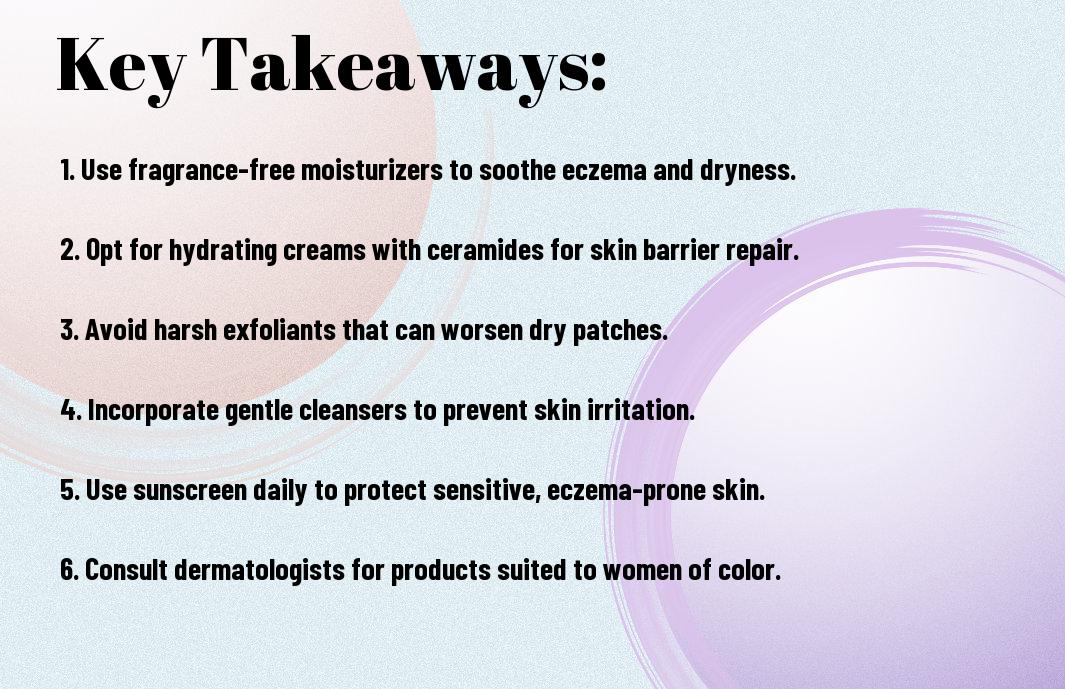
Over the years, I’ve learned that managing eczema and dry patches requires a thoughtful approach, especially for women of color who may face unique skin challenges. Understanding your skin’s needs is vital; using the right skincare products can make a significant difference in alleviating irritation and promoting a healthy glow. In this post, I will share my insights on effective products and strategies tailored to help you navigate your skincare journey with confidence and ease.
Key Takeaways:
- Understand the unique skincare needs of women of color, as skin tone and type can influence the appearance and treatment of eczema and dry patches.
- Opt for products that are formulated specifically for sensitive skin to minimize irritation and support skin health.
- Incorporate moisturizing ingredients such as shea butter, ceramides, and glycerin to hydrate and nourish the skin effectively.
- Avoid fragrances and harsh chemicals that can exacerbate dryness and irritation; choose hypoallergenic options whenever possible.
- Consider consulting with a dermatologist to create a tailored skincare routine that addresses individual concerns and sensitivities.
- Look for products that include anti-inflammatory ingredients like aloe vera or colloidal oatmeal to soothe inflamed skin.
- Regularly apply moisturizers, especially after bathing, to lock in moisture and maintain skin barrier integrity.

The Unique Challenges of Eczema in Women of Color
The experience of living with eczema can significantly differ for women of color due to a variety of factors, including skin pigmentation, cultural perceptions, and the availability of tailored skincare products. For many, eczema symptoms may present differently on darker skin tones, making diagnosis and treatment even more complex. Additionally, there can be a cultural stigma surrounding skin conditions that leads to feelings of shame or a lack of support. Addressing these unique challenges is vital for effective management and achieving healthier skin.
Dispelling Myths: Prevalence and Perception
There is a common misconception that eczema is less prevalent among women of color. In reality, studies show that while the visibility of the condition may differ based on skin type, the prevalence remains consistent across demographics. This misperception can lead to inadequate treatment options and a lack of resources tailored to this group. Understanding these statistics can help advocate for better-targeted solutions and greater awareness within the healthcare community.
Understanding Skin Function and Reactions
Skin function varies across different ethnicities, affecting how eczema manifests and responds to treatments. The outer layer of skin, the epidermis, may have differing thickness and barrier function depending on your ancestry, influencing moisture retention and vulnerability to irritants. For example, darker skin often contains more melanin, which can provide some natural protection, yet may also exhibit different inflammatory responses during eczema flare-ups. Recognizing your individual skin’s characteristics can guide you in selecting the most effective skincare products and routines.
The structural differences in skin can mean that standard eczema treatments might not yield the desired results. Acknowledging this, I’ve found that products specifically formulated for diverse skin types offer better hydration and healing outcomes. Emollients enriched with ceramides or glycerin can significantly improve skin barrier repair, while mild, fragrance-free cleansers reduce irritation and sensitivity. Tailoring your treatment plan to your unique skin function ensures a more effective approach to managing eczema.
Ingredients That Heal: What to Look For
Identifying the right skincare ingredients is vital for managing eczema and dry patches, especially for women of color. Focus on products formulated with gentle, natural ingredients that nourish and protect your skin barrier. Consider ingredients like ceramides, hyaluronic acid, and shea butter which provide hydration and restore moisture levels without irritating the skin. Additionally, look for products free from fragrances and alcohols as these can exacerbate dryness and inflammation.
Essential Moisturizers and Their Role
Essential moisturizers serve as the foundation of any skincare routine for dry skin. I personally find that products containing emollients help to lock in moisture and create a protective barrier against environmental stressors. Ingredients like glycerin and petrolatum can drastically improve hydration levels, making your skin feel supple and smooth. Applying moisturizers immediately after bathing helps trap water in the skin, providing an extra layer of defense against dryness.
Active Ingredients: The Science Behind Relief
Active ingredients provide targeted relief for eczema symptoms. Ingredients like zinc oxide and colloidal oatmeal have been proven to relieve itching and reduce inflammation effectively. For those struggling with more severe symptoms, topical corticosteroids can help to reduce redness and swelling. Each of these active ingredients works on a cellular level to promote healing and restore the skin’s natural barrier, helping to fend off flare-ups and discomfort.
For example, ceramides play a key role in maintaining your skin’s hydration by creating a barrier that minimizes water loss. Studies show that using ceramide-infused products can improve skin barrier function and significantly enhance hydration levels, especially for those of us with compromised skin. Similarly, active compounds like beta-glucan have soothing properties that can help calm inflammation; this ingredient has shown great results in clinical trials, demonstrating improvements in skin moisture and elasticity for individuals with eczema. With the right combination of active ingredients, you can not only alleviate the symptoms of eczema but also promote overall skin health and resilience.
Navigating the Skincare Aisle: Recommended Products
Finding the right products amidst a myriad of options can be overwhelming, especially when searching for solutions for eczema and dry patches. I recommend focusing on products specifically designed for sensitive skin, often labeled as hypoallergenic or non-comedogenic. Begin your journey by exploring several top-rated brands that provide effective moisturizers and treatments. Their formulations are tailored to nourish and soothe your skin’s unique needs, ensuring you feel confident and comfortable.
Top Moisturizers for Protection and Healing
Choosing the right moisturizer is necessary for providing a barrier against environmental irritants while promoting healing. Look for products containing ceramides, glycerin, and sheer butter. These ingredients work synergistically to lock in moisture and restore the skin’s natural barrier. Brands like CeraVe and Eucerin have excellent options that create an optimal environment for your skin to heal without complicating your routine.
Specific Brands That Cater to Diverse Skin Types
Addressing the skincare needs of diverse skin types is crucial, particularly for women of color. Brands like SheaMoisture and Black Girl Sunscreen prioritize ingredients that nourish and protect melanin-rich skin. They offer well-formulated products that tackle dryness while also addressing hyperpigmentation and uneven skin tone. For instance, SheaMoisture’s products are enriched with natural oils and botanical extracts that enhance the moisture balance.
| Product | Key Ingredients |
|---|---|
| CeraVe Moisturizing Cream | Ceramides, Hyaluronic Acid |
| Eucerin Advanced Repair Lotion | Urea, Ceramides |
| SheaMoisture Raw Shea Butter | Shea Butter, Argan Oil |
| Black Girl Sunscreen | Avobenzone, Coconut Oil |
| Neutrogena Hydro Boost Gel Cream | Hyaluronic Acid, Olive Oil |
SheaMoisture and Black Girl Sunscreen not only feature ingredients that are beneficial for your skin but also celebrate your heritage and culture through their marketing and product formulations. Both brands cater specifically to the demands of melanin-rich skin, focusing on hydration and protection while being free of harmful chemicals. Additionally, their use of organic and sustainably sourced materials reiterates their commitment to quality and environmental care. This lets you make mindful purchases that prioritize both your skin’s health and the planet.
- Melanin-rich skin benefits from products catering to unique needs.
- Seek natural ingredients that promote healing and hydration.
- Explore brands like SheaMoisture for tailored skincare solutions.
- Moisturizers should target both dryness and uneven tone.
- This selection allows you to nurture your skin while supporting brands that prioritize diversity.
Building a Consistent Skincare Routine
Establishing a consistent skincare routine tailored to your skin’s unique needs can significantly improve your eczema and dry patches. The key is to incorporate products that hydrate, nourish, and protect your skin barrier while minimizing irritation. Aim for a regimen that includes gentle cleansing, moisturizing, and targeted treatment for flare-ups. By following the same steps daily, you ensure your skin remains balanced and resilient.
Steps for Daily and Weekly Care
For daily care, I recommend cleansing your face with a mild, sulfate-free cleanser followed by a rich moisturizer infused with ceramides and hyaluronic acid. After washing, applying a targeted treatment containing corticosteroids or anti-inflammatory ingredients can help alleviate any flare-ups. Once a week, consider using a nourishing mask rich in antioxidants to provide extra hydration and repair your skin.
Additional Therapies: When to Seek Professional Help
If your condition persists despite at-home care, or if you experience severe itching, redness, or swelling, it may be time to consult a dermatologist. Specialized treatments, such as prescription topical medications or light therapy, can offer significant relief. There could also be underlying issues, such as allergies or infections, requiring specific tests and interventions.
Seeking professional help has its benefits, especially if you’ve already tried over-the-counter products without success. A dermatologist can provide a comprehensive skin analysis tailored specifically to your unique skin type and pigmentation, which is often overlooked. They may suggest a customized treatment plan that includes advanced therapies or prescriptions, ensuring that you effectively address your eczema or dry patches while enhancing your overall skin health.

Empowering Voices: Personal Stories and Insights
Sharing personal experiences of dealing with eczema and dry patches connects us and highlights our resilience. Many women of color have navigated struggles with their skin and often felt isolated. Yet, by voicing our journeys, we can inspire each other and shed light on the challenges faced. I invite you to explore these stories and see common threads of triumph, self-acceptance, and the search for effective solutions that empower us all.
Overcoming Stigma: Real Experiences of Women of Color
Stigma surrounds skin conditions like eczema, often leading to feelings of embarrassment or shame. For women of color, this can be compounded by cultural standards of beauty and skin perfection. Many of us have faced judgment about our skin, yet I’ve learned that sharing our stories has a remarkable way of breaking down these barriers. Celebrating our uniqueness and advocating for ourselves can inspire others to embrace their own journeys.
Community Resources and Support Networks
Finding support through community resources can transform your experience with eczema and dry patches. Numerous organizations focus on educating and supporting women of color with skin concerns, offering workshops, online forums, and informational resources. Engaging with these groups fosters a sense of belonging and provides access to valuable knowledge that can aid in managing your skin condition effectively.
Connecting with local and national organizations, such as the Eczema Society of Canada or the National Eczema Association, can provide crucial education and support tailored to women of color. Joining social media groups or community forums creates opportunities to share experiences and gain insights from others facing similar challenges. These platforms offer a wealth of information on effective skincare routines, emotional support, and navigating treatment options, reminding us that we’re not alone on this journey.
Final Words
Ultimately, navigating eczema and dry patches as a woman of color requires a tailored approach to skincare. I understand the importance of using products that not only hydrate but also suit your unique skin tone and needs. By choosing the right ingredients and being mindful of your skincare routine, you can effectively manage your symptoms and enjoy healthier, more vibrant skin. Empower yourself with knowledge and confidence—I believe you can achieve the relief and glow you deserve.
FAQ
Q: How does skin tone affect the appearance and treatment of eczema?
A: Skin tone can influence how eczema manifests and how it is treated. Women of color may experience more hyperpigmentation and darker patches after eczema flare-ups, making it crucial to choose products that address dryness while also targeting discoloration. It’s important to find creams and lotions that are specifically formulated for various skin tones to ensure effective results.
Q: What ingredients should I look for in skincare products to treat eczema?
A: Effective ingredients for treating eczema and dry patches include ceramides, hyaluronic acid, colloidal oatmeal, and shea butter. These components help to restore the skin barrier, provide moisture, and reduce inflammation. Additionally, products with steroid-free anti-inflammatory ingredients can be beneficial for calming flare-ups.
Q: Are there any products specifically designed for women of color with eczema?
A: Yes, numerous brands focus on creating formulations suitable for women of color. Look for products that state they are dermatologically tested for darker skin tones and emphasize hydration and repair. Brands that specialize in inclusive skincare often have lines that cater to the unique needs of various skin types and tones, particularly for managing eczema.
Q: How can I prevent eczema flare-ups?
A: To prevent eczema flare-ups, establish a consistent skincare routine. This includes daily moisturizing with thick creams or ointments, avoiding harsh soaps or fragrance-filled products, and keeping cool during hot weather. Patch testing new products is also advisable to ensure they don’t exacerbate the condition.
Q: Can diet impact eczema symptoms in women of color?
A: Yes, diet can significantly influence eczema symptoms. Foods rich in anti-inflammatory properties, like omega-3 fatty acids, can improve overall skin health. Conversely, certain triggers such as dairy, nuts, or gluten can exacerbate the condition in some individuals. It’s beneficial to maintain a balanced diet and consult with a healthcare provider to identify potential triggers related to personal dietary habits.
Q: How often should I apply moisturizer when dealing with eczema?
A: It is advisable to apply moisturizer at least twice a day, or more frequently during flare-ups. Moisturizing should ideally be done right after bathing to lock in moisture. Using thicker creams or ointments can help create a protective barrier on the skin, which is particularly beneficial for managing dry patches effectively.
Q: When should I seek professional help for my eczema?
A: If home treatments and over-the-counter products do not provide relief or if the condition worsens, it is time to seek professional help. Additionally, if you experience severe itching, pain, or signs of infection, a dermatologist can provide tailored advice and possibly recommend prescription medications or specialized treatments suitable for your skin type.











